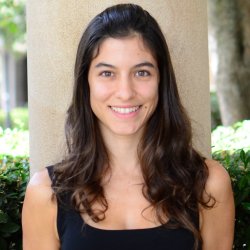
Dr Catxere Casacio
About
Biography
Catxere Casacio is a quantum bio-physicist of the School of Biosciences and Medicine at the University of Surrey. She currently works as a Research Fellow in Experimental Quantum Biology and is developing the experimental part of the project "Life on the edge: quantum thermodynamics, quantum biology and the arrow of time", funded by the John Templeton Foundation.
She completed her PhD at the University of Queensland, Australia, in 2021. During her PhD, she worked on applying quantum properties of light to enhance microscopes for bio-medical imaging. She was the first to create a quantum-enhanced optical microscope and image biological samples with it.
Prior to this project, Cat completed an optical engineering degree at the Institut d’Optique in France, followed by a Master’s degree at ParisTech. For her main project, at the Laboratoire Kastler Brossel, she designed and built a cavity for single-pass squeezed states of light for femtosecond pulses. This work also led to partnerships and projects performed at universities in both Brazil (University Federal de Pernambuco) and Spain (University of La Laguna), before starting her PhD in Australia.
Cat has always been passionate about light. Her scientific engagements started at the age of 13, when her curiosity also for mathematics and philosophy led to a passion for astronomy. During two consecutive years of high school she won medals for the national astronomy and astronautics contest (OBA), and went on to complete her bachelor's degree in Physics at the University of São Paulo, Brazil.
Her commitment to diversity and inclusion in the workplace motivates her to actively work in committees for equity, diversity, mentoring and career development, including at the Australian Research Council Centre of Excellence for Engineered Quantum Systems (EQUS).
Cat is motivated to use her knowledge in impactful projects to help the community, the environment and to expand the limits of our understanding of the Universe.
News
In the media
ResearchResearch projects
This project aims to advance fundamental understanding of how living systems maintain, or even manipulate, the reversibility of the quantum laws in highly complex living cells where decoherence would be expected to be almost instantaneous. Fluorescent protein will be used as a model system to explore such a fundamental question experimentally. Modern molecular and synthetic biology techniques, specifically site-directed mutagenesis, and time-resolved fluorescence spectroscopy will be employed to reveal how quantum states and particularly coherent energy transfer is maintained in fluorescent proteins for physiologically relevant timescales.
Research projects
This project aims to advance fundamental understanding of how living systems maintain, or even manipulate, the reversibility of the quantum laws in highly complex living cells where decoherence would be expected to be almost instantaneous. Fluorescent protein will be used as a model system to explore such a fundamental question experimentally. Modern molecular and synthetic biology techniques, specifically site-directed mutagenesis, and time-resolved fluorescence spectroscopy will be employed to reveal how quantum states and particularly coherent energy transfer is maintained in fluorescent proteins for physiologically relevant timescales.